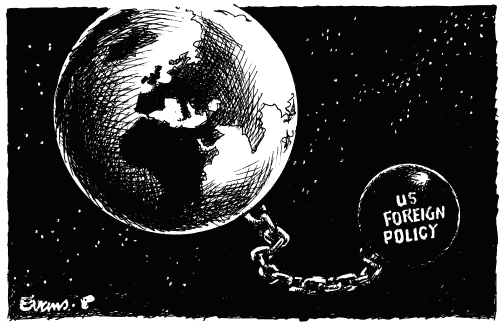As China Rises, It Should Study American Isolationism
(China) on 30 November 2010
by 熊志勇 (link to original)
At the turn of the 20th century, the world had three powerful nations: Japan in Asia, Germany in Europe and the U.S. in North America. All of these nations ambitiously strove to become the dominant power. They not only needed to contest with the hegemonic power at that time, England, they also needed to compete with one another. Japan and Germany both elected to use the traditional method of expanding a nation’s power. This method consisted of populists leading the country to militarism under the banner of patriotism. In the end, due to the collective resistance of England, the U.S. and China, these two countries met with disastrous failure.
The U.S. selected a method of development significantly different from the one mentioned above. As early as 1796, George Washington stated in his Farewell Address: “Europe has a set of primary interests which to us have none; or a very remote relation. Hence she must be engaged in frequent controversies, the causes of which are essentially foreign to our concerns. Hence, therefore, it must be unwise in us to implicate ourselves by artificial ties in the ordinary vicissitudes of her politics, or the ordinary combinations and collisions of her friendships or enmities.”
[In other words], “We are aloof with the outside world; this is the different route that we must follow.” After America’s founding, this isolationist policy was followed for half a century. This “isolationist policy” cannot be understood at first glance. In truth, it is America’s pursuit of a policy of neutrality and avoidance of alliances; a policy of not getting involved in other countries’ quarrels and decreasing the possibility of the U.S. getting involved in disputes, especially with strong countries. From an external standpoint, this policy helped America maintain its independence. From an internal standpoint, it allowed the American government to centralize power in order to solve domestic issues.
America implemented this policy not only in the 19th century, but in the first 40 years of the 20th century as well. What were the results? By the end of the 19th century, America had become the world’s most industrially productive country; before World War I, they became the largest hub of international trade, and in the 1920s they had developed one of the world’s strongest militaries.
Notably, until the all-out eruption of World War II, the world’s strongest country took a weak stance in international affairs; for this, the U.S. was met with a lot of criticism. Perhaps even now many people find it hard to understand America’s decisions then. At that time, the American government’s concentrated efforts to resolve the worldwide economic crisis brought many problems. Even though Japan’s actions hurt American interests, the U.S. president, after calculating the pros and cons, still decided not to retaliate. Then, at the end of the 1930s, even after dealing with continuous economic crisis, America’s power rose significantly. America’s military capability quickly surpassed Japan; in addition, they held a higher moral ground. When the Asia-Pacific War erupted, Japanese generals were already familiar with the feeling of defeat. First in Europe, then in Asia, America achieved complete victory; they beat their enemies to the point of not needing to worry about retaliation.
Looking at these events from a different perspective, even though America was in its isolationist period, it still wasn’t idle in international affairs. After 1945, America constructed a new international system in which it would be the leader. This huge task is not something that can be accomplished in a short period of time. Actually, as early as the beginning of the century or even earlier, Americans were already contemplating and anticipating what form international relations might take and what their next step in development would be. Along with developing domestically and internationally, America gradually developed a set of principles that separated itself from England’s colonial empire. These included the collaboration of large countries’ governments and free trade, among other ideas. While developing hard power, America didn’t forget to go through a range of mediums to disseminate various cultural concepts. These included Christian missions and channels of cultural exchange. The development of its soft power allowed America to establish a totally new image in the time of colonialism.
People can find that there was a lot of criticism of America at that time — but the resounding echoes of accolades are much louder. In that half-century, just look at what high expectations previous Chinese administrations had for America. And look at Mao’s evaluation of America while he was in Yan’an. We cannot be surprised that in the 1940s America was able to establish an international system in which it took the lead. Just as flowing water will form a ditch, this was something that happened naturally.
The author is a professor at China Foreign Affairs University.

